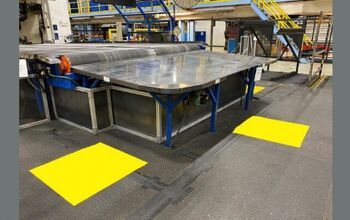VW CEO Suggests Fuel Cell Tech Isn't the Answer, No Duh

Volkswagen Group CEO Herbert Diess was bashing hydrogen-powered vehicles on Twitter this week in an attempt to convince those vying for Germany’s chancellorship not to embrace the technology. With Angela Merkel stating that she’ll not seek a fifth term, the country is open for new leadership and VW wouldn’t want them to take a liking to hydrogen power when it has placed all of its eggs into the electric vehicle basket.
“The hydrogen car has been proven NOT to be the climate solution,” Diess wrote on Twitter in German. “In transportation, electrification has prevailed. Sham debates are a waste of time. Please listen to the science!”
It’s uncommon to see any automotive executive take such a bold stance against any alternative energy solution, as many manufacturers spent the last decade hedging their bets by investing in both battery-electric cars and those utilizing hydrogen power. But the infrastructure for the latter is nowhere near ready to accommodate widespread adoption and the process of producing the fuel has not resulted in the kind of breakthrough that makes it seem as though it would offer true benefits.
Diess directed his comments at Armin Laschet (head of Germany’s Christian Democratic Union), Olaf Scholz (German Finance Minister), Annalena Baerbock (Green Party candidate), and Andreas Scheuer (German Transportation Minister). His words were accompanied by a report from Handelsblatt covering a study from the Potsdam Institute for Climate Impact Research alleging that pursuing hydrogen vehicles at their present level of technology would probably do the environment more harm than good.
Frankly, the benefits of all alternative energy solutions tend to be overblown by the interested parties. But hydrogen fuel cell technologies seem to represent the largest gap between what is currently possible and what everyone was hoping to achieve. The big concern is the amount of energy it takes to produce and move hydrogen in meaningful volumes seems to result in a scenario where you’re expending more energy than you would have if you just skipped the whole ordeal in the first place.
Despite having waste issues of their own, electric vehicles seem a far more viable option with noted progress. Of course, automakers don’t want to be left in the dust should there be a miracle breakthrough in hydrogen production or governments begin incentivizing the fuel — so there are still a decent number of brands perpetuating their commitment to fuel cell technology.
Volkswagen is not among them and has been fairly critical of hydrogen power, though it frequently hinges on making statements about “trusting the science” rather than providing a detailed breakdown of why it probably won’t work. As things currently stand, electric vehicles are vastly more efficient in terms of total well-to-wheel energy consumption. That, and national energy grids serving as an existing foundation upon which to build charging networks, has made them the dominant form of alternative energy vehicles.
With your author constantly complaining about how EVs are less convenient than advertised, thanks largely to a lackluster (but growing) infrastructure, there’s no way swapping to hydrogen power makes any sense. Outside of Pacific Asia, coastal California, and a smattering of European hot spots, there is basically no fueling network to speak of. That effectively locks owners into driving exclusively within those regions or hauling around gas canisters sized to fit inside a space rocket. It also explains why Japanese and Korean brands have taken a keener interest in the fuel and tend to expend the most cash on developing FCEVs.
But electrification is currently being spurred by government around the world and, if Germany starts playing favorites with hydrogen, there’s a chance automakers ignoring it could be kicking themselves a few years down the road — however unlikely and energy inefficient that currently seems.
[Image: Literator/Shutterstock]

A staunch consumer advocate tracking industry trends and regulation. Before joining TTAC, Matt spent a decade working for marketing and research firms based in NYC. Clients included several of the world’s largest automakers, global tire brands, and aftermarket part suppliers. Dissatisfied with the corporate world and resentful of having to wear suits everyday, he pivoted to writing about cars. Since then, that man has become an ardent supporter of the right-to-repair movement, been interviewed on the auto industry by national radio broadcasts, driven more rental cars than anyone ever should, participated in amateur rallying events, and received the requisite minimum training as sanctioned by the SCCA. Handy with a wrench, Matt grew up surrounded by Detroit auto workers and managed to get a pizza delivery job before he was legally eligible. He later found himself driving box trucks through Manhattan, guaranteeing future sympathy for actual truckers. He continues to conduct research pertaining to the automotive sector as an independent contractor and has since moved back to his native Michigan, closer to where the cars are born. A contrarian, Matt claims to prefer understeer — stating that front and all-wheel drive vehicles cater best to his driving style.
More by Matt Posky
Latest Car Reviews
Read moreLatest Product Reviews
Read moreRecent Comments
- Bd2 Lexus is just a higher trim package Toyota. ^^
- Tassos ONLY consider CIvics or Corollas, in their segment. NO DAMNED Hyundais, Kias, Nissans or esp Mitsus. Not even a Pretend-BMW Mazda. They may look cute but they SUCK.I always recommend Corollas to friends of mine who are not auto enthusiasts, even tho I never owed one, and owned a Civic Hatch 5 speed 1992 for 25 years. MANY follow my advice and are VERY happy. ALmost all are women.friends who believe they are auto enthusiasts would not listen to me anyway, and would never buy a Toyota. They are damned fools, on both counts.
- Tassos since Oct 2016 I drive a 2007 E320 Bluetec and since April 2017 also a 2008 E320 Bluetec.Now I am in my summer palace deep in the Eurozone until end October and drive the 2008.Changing the considerable oils (10 quarts synthetic) twice cost me 80 and 70 euros. Same changes in the US on the 2007 cost me $219 at the dealers and $120 at Firestone.Changing the air filter cost 30 Euros, with labor, and there are two such filters (engine and cabin), and changing the fuel filter only 50 euros, while in the US they asked for... $400. You can safely bet I declined and told them what to do with their gold-plated filter. And when I changed it in Europe, I looked at the old one and it was clean as a whistle.A set of Continentals tires, installed etc, 300 EurosI can't remember anything else for the 2008. For the 2007, a brand new set of manual rec'd tires at Discount Tire with free rotations for life used up the $500 allowance the dealer gave me when I bought it (tires only had 5000 miles left on them then)So, as you can see, I spent less than even if I owned a Lexus instead, and probably less than all these poor devils here that brag about their alleged low cost Datsun-Mitsus and Hyundai-Kias.And that's THETRUTHABOUTCARS. My Cars,
- NJRide These are the Q1 Luxury division salesAudi 44,226Acura 30,373BMW 84,475Genesis 14,777Mercedes 66,000Lexus 78,471Infiniti 13,904Volvo 30,000*Tesla (maybe not luxury but relevant): 125,000?Lincoln 24,894Cadillac 35,451So Cadillac is now stuck as a second-tier player with names like Volvo. Even German 3rd wheel Audi is outselling them. Where to gain sales?Surprisingly a decline of Tesla could boost Cadillac EVs. Tesla sort of is now in the old Buick-Mercury upper middle of the market. If lets say the market stays the same, but another 15-20% leave Tesla I could see some going for a Caddy EV or hybrid, but is the division ready to meet them?In terms of the mainstream luxury brands, Lexus is probably a better benchmark than BMW. Lexus is basically doing a modern interpretation of what Cadillac/upscale Olds/Buick used to completely dominate. But Lexus' only downfall is the lack of emotion, something Cadillac at least used to be good at. The Escalade still has far more styling and brand ID than most of Lexus. So match Lexus' quality but out-do them on comfort and styling. Yes a lot of Lexus buyers may be Toyota or import loyal but there are a lot who are former GM buyers who would "come home" for a better product.In fact, that by and large is the Big 3's problem. In the 80s and 90s they would try to win back "import intenders" and this at least slowed the market share erosion. I feel like around 2000 they gave this up and resorted to a ton of gimmicks before the bankruptcies. So they have dropped from 66% to 37% of the market in a quarter century. Sure they have scaled down their presence and for the last 14 years preserved profit. But in the largest, most prosperous market in the world they are not leading. I mean who would think the Koreans could take almost 10% of the market? But they did because they built and structured products people wanted. (I also think the excess reliance on overseas assembly by the Big 3 hurts them vs more import brands building in US). But the domestics should really be at 60% of their home market and the fact that they are not speaks volumes. Cadillac should not be losing 2-1 to Lexus and BMW.
- Tassos Not my favorite Eldorados. Too much cowbell (fins), the gauges look poor for such an expensive car, the interior has too many shiny bits but does not scream "flagship luxury", and the white on red leather or whatever is rather loud for this car, while it might work in a Corvette. But do not despair, a couple more years and the exterior designs (at least) will sober up, the cowbells will be more discreet and the long, low and wide 60s designs are not far away. If only the interiors would be fit for the price point, and especially a few acres of real wood that also looked real.


































Comments
Join the conversation
"The hydrogen car has been proven NOT to be the climate solution" Devote enough of society's time and effort solely to robbing competent, literate, productive people; in order to transfer all wealth to connected utter abject retardos in FIRE and ambulance chaser rackets, and you've got a perfect retardtopia: All resources controlled by dimbulbs so completely devoid of even the basic ability to put a coherent thought together, that their standard for what passes for "proof", involves a "solution" to nothing but figments of dumb peoples imaginations, the "solution" of which has not yet even been attempted, yet has magically "proven" something..... Great "proof" there, monkey! Par for the course for a financialized Dystopia ran, as are all such insults to eonomic literacy, by and for rank idiots.
Take 500lbs out of every new car and you'd save vast amounts of emissions.